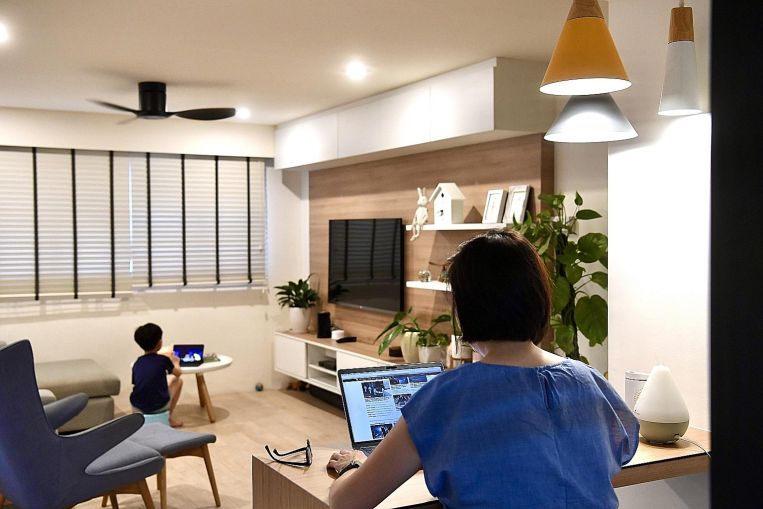With major chunks of the workforce working from home amid the coronavirus outbreak, Internet data traffic has surged in Singapore by as much as 60 per cent, according to Internet service providers (ISPs).
MyRepublic has been experiencing the upper end of the increase in daytime traffic in the past month, while ViewQwest has seen an overall spike of 30 per cent. Singtel has also reported a noticeable increase in network traffic, while StarHub has seen more clients on the Internet in the daytime.
Data centre provider Equinix said: “In Singapore, we have witnessed a 30 per cent surge in Internet exchange traffic, with the country currently seeing one of the highest overall in the world. The current shift in digital consumption patterns has never been so drastic in such a short span of time.”
This huge uptick in demand for Internet services is in line with what is happening around the world as more companies activate business continuity plans and send employees home to work remotely.
In some countries, entire cities have been asked to remain indoors, leading to household members fighting for Internet bandwidth at the same time, including bandwidth cloggers such as video streaming or gaming services.
Fortunately, there appears to be little strain on the Internet here, thanks to Singapore’s earlier plans to equip every home with ultra-fast fibre broadband. ISPs also told The Straits Times that they regularly maintain and upgrade their systems and have enough capacity to buffer for the higher usage.
This is unlike in Europe and the United States, where the Internet has been reported to have slowed down dramatically. Many households in Britain, for example, do not have fibre broadband connections and lack sufficient bandwidth for high-intensity Internet usage.
ViewQwest chief executive Vignesa Moorthy said Singapore’s Internet is robust as most people here have Gigabit connections, which can accommodate much more activity online at the same time, and at faster speeds.
“So, even though data traffic has gone up, it has not had an impact on performance for our customers – especially if they are using the Internet for local services such as watching Netflix here or making video calls with other Singaporeans.”
It is only when users here take up video calls with those outside Singapore, such as in Australia or Europe, that there may be some degradation in performance, he added. “That is because Internet usage there is putting huge strains on their infrastructure.”
However, Mr Moorthy noted some employees here may have suffered slower Internet speeds while connected to office networks from home. But this is due to companies not purchasing adequate virtual private network (VPN) licences or bandwidth for everyone to use.
Tips for a smoother connection
• Almost all work meetings happen at the top or bottom of the hour, so everyone is trying to connect to the server at the same time. Offset this by 10 or even five minutes and you could get a better experience.
• Download larger files overnight when the network is less busy.
• Deploy more access points or Wi-Fi extenders for better Internet coverage throughout homes.
• If you are not an active participant of a call, skip it. For webinars with a replay option, watch them later. Reducing the number of people on a call helps with the overall connection.
SOURCE: ALPER TURKEN, COMMSCOPE’S SENIOR VICE-PRESIDENT, SERVICE PROVIDER, ASIA-PACIFIC
“Most corporations have some VPN in place, but only for maybe 10 per cent to 20 per cent of the workforce. In this current situation, where you have the entire workforce at home and all trying to log in at the same time, that is where the chokepoint happens,” he said.
VPNs are necessary for many business purposes as they act as a secure pipe between an employee’s device and the company network so that data sent between the two is encrypted, even if the person is telecommuting. Now that so many more people are trying to squeeze through this same pipe, it causes the Internet to slow down for all users.
Mr Harold Li, vice-president of popular VPN provider ExpressVPN, said usage of its service here has gone up by 11 per cent since end-February. He said: “We are seeing strong demand for our services as more people spend more time indoors and employees around the world telework.”
Mr Ian Fogg, vice-president of analysis at mobile analytics company Opensignal, said the recent developments demonstrate the great need for 5G, the super speedy fifth-generation wireless technology.
“The need for 5G is even clearer, now that the world is heavily reliant on telecommunications and mobile connectivity to go about our daily lives,” he said.
Have a question on the coronavirus outbreak? E-mail us at [email protected]
To get alerts and updates, follow us on Telegram.
Source: Read Full Article
